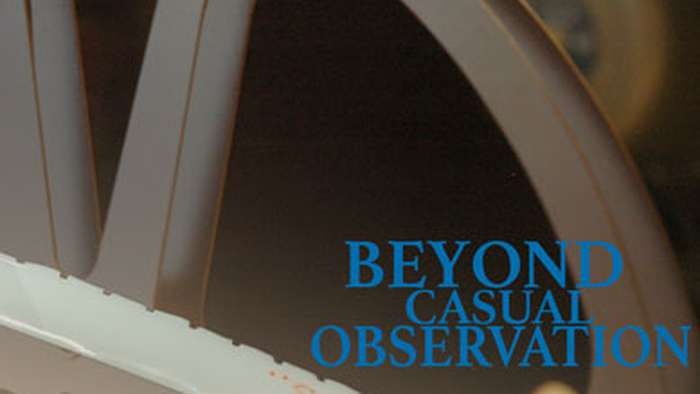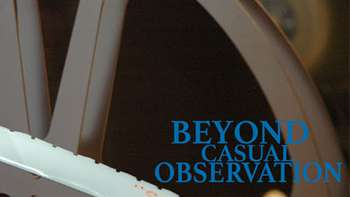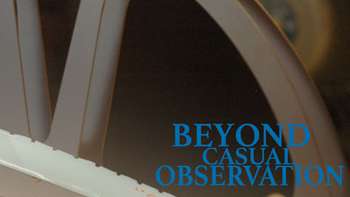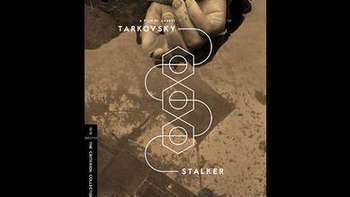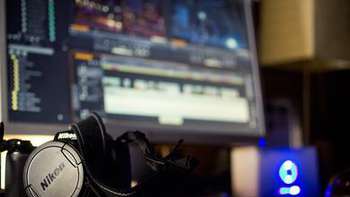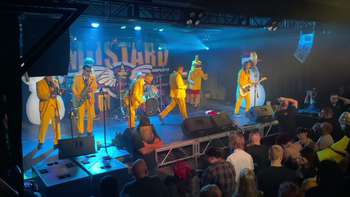In the previous installment of Beyond Casual Observation, we visited with three films to briefly illustrate the pleasant entanglement of music and storytelling in cinema. By looking at three different films from different eras, we attempted to express the resonant value of sound in film.
I have always been fascinated and invigorated by the idea of film scores and ambience provided by someone otherwise known as instrumentalist or person in a band. Johnny Greenwood’s score for There Will Be Blood, Neil Young’s performance for Dead Man, Thom Yorke’s work for Suspiria (whose original score was written by a band, Goblin), are notable examples of musicians from bands taking their talent to the screen. In Goblin’s case, they often perform live to a visual accompaniment.
To hear a composer talk about emotion, the pulse of a scene, two notes, and why an incomplete sounding progression accompanies an incomplete character, I hear an analysis fundamentally similar to one you might hear in a band's writing session. Audiences are on the receiving end of every musician who makes his or her work public. Whether how a single person is affected by a song on an album they are listening to at home, to how a screen audience experiences a scene, the communication between musicians and audiences is essential. For each voice expressed there is hopefully a voice heard.
In film, a composer’s biggest challenge may be their own comprehension of the visual material, self-doubts, or of the process working with others who are invested in the visual piece. An audience's difficulty may be in their own associations of musical stylings, or of their interpretation of on-screen events. Together, a composer and an audience are both trying to find their way through the story and, ultimately, how that story feels to them. (Although a more self-aware or purely voyeuristic perspective can exist, we shall stay in a particular lane in this article.)
That dynamic relationship with audiences made me want to seek out someone who has a story to share about being a musician and forging their part in the art of visual storytelling.
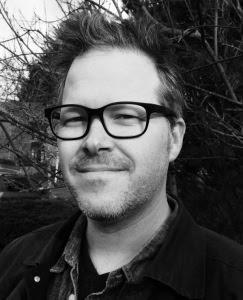 John Morgan Askew: producer, musician, engineer, and mixer. Of music in bands, of sound and music in film, John Morgan Askew is a worker in the aural spectrum. Recent work includes The Imperial, the new album from The Delines, Laura Gibson's latest release, Goners, as well as Do Not Pass Go from Hyrax Films, and a 2015 documentary about internet privacy Terms and Conditions May Apply.
John Morgan Askew: producer, musician, engineer, and mixer. Of music in bands, of sound and music in film, John Morgan Askew is a worker in the aural spectrum. Recent work includes The Imperial, the new album from The Delines, Laura Gibson's latest release, Goners, as well as Do Not Pass Go from Hyrax Films, and a 2015 documentary about internet privacy Terms and Conditions May Apply.
“In the early days of recording I realized how visual music was for me. Recording taught me how to make music have a certain geography.”
In 2018 it is easy to think that we are all behind. Social media insists that my peers are doing more than I am and that being busy is the key to life. Everything I see is a quick ad, every scene consists of numerous quick cuts and Michael Mann films are still the best at extending time, without slowing it down, to show us the nuts and bolts of processes. Every finished product had processes. Every peak has a base. John Morgan Askew has spent years building his skill set: a wide base in music ranging from writing, to recording, and placing sound to image.
“I started out playing bass and guitar in bands in high school -- and bought a 4-track and started recording that way,” John says. “My parents let me put a little studio / practice space in the garage (you know with mattresses and sheets everywhere) so I was able to learn the basics of recording, mic placement and bouncing tracks. It was a natural progression from there. I soon bought a high end 4-track, then an 8-track.”
John Morgan Askew’s work as an engineer starts in 1996 as an engineer in Portland, Oregon at Type Foundry Recording.
“It was all analog recording in those days so I learned how to make records using 16-track and 24-track machines. The recording studio was a dream for me. I loved being there. The studio became an instrument more than any other. I don’t think I really ever cared too much about engineering, more-so I became really comfortable using the studio as a creative tool -- a place to experiment and try things out and learn,” explains John. “It was always interesting to try and place sounds into the geography and space of a mix (not to the Left or to the Right – but deep into the field). I suppose my serious interest in recording and making records allowed me to work with other, more talented artists and songwriters, and to continue developing the skill.”
While growing his skills as an engineer, John continues to write and his musical sensibility flourishes. He describes the move into writing sound for film rather organically.
“Creating music is so important to me as a way to survive (mentally speaking)," he says. "It is easy for me to get lost in the studio and I find that to be good for my mental health. Certainly it can be a task but I don’t mind that. I really love sound and making and archiving sounds and learning along the way. The process -- the experimental aspect to it -- is what really keeps me going.”
He adds insight into his own inner workings.
"Much of what I write comes as a brief idea or a sound that inspires me to keep on going," John says. "Usually it is just one small sonic element that pushes it along. When I work with other artists as a producer, or a mixer, I tend to know what I’m going for before I start -- it’s much less spontaneous. As a writer for picture, however, I just start with one sound or one instrument and see if it feels worthwhile to keep it going.”
"Regardless if there is an actual picture to look at, music can be so visual for me. It creates the sonic space, or the geography, to exist in."
Among his influences are Juana Molina, Laurie Speigel (John notes the effort on Expanding Universe), Mica Levi, Reinhold Heil, Ben Frost, and Tim Hecker. While John’s work is informed and influenced by the work of others, the range of things that influence him extend outside of studio walls.
“I remember arriving in Brighton, England for the first time and I was in the downtown area with tons of hip shops and pedestrians walking -- I was really overwhelmed and jet lagged -- I decided to put on my headphones and listen to the score of The Proposition by Nick Cave and Warren Ellis (one of my favorite scores),” he recalls. “It intensely framed my walk through this town in a way that was perfect. The score put a perfect, dark, messed up glaze over this city and the merchandise in the windows and the cars and people. I suppose it just made me feel less a part of the crowd and more of an observer to the scene. It felt right.“
“Regardless if there is an actual picture to look at, music can be so visual for me. It creates the sonic space, or the geography, to exist in.”
John’s ability to draw an image from music relates to a sentiment he shares about his own ear for music.
“As for composing for film, I have always loved instrumental music and always related more to the sounds of an album than the lyrics,” he says.
He dives deeper into explaining the association of music and imagery.
“Drum sounds and guitar tones, etc… My solo project Tracker (which was really just a huge experiment in recording -- thus the band name) was all about creating a visual in music. The first two records were made for driving across the desert, in between cities. The long road trip is about passing moments so I thought it would be cool to have album feel like that. Eventually I did an instrumental soundtrack for a graphic novel by Craig Thompson (Tracker – Blankets: Recordings for the Illustrated Novel). It was a huge learning experience which led to my first film score project (Calvin Marshall). Once I had the opportunity to do a film score, I knew I wanted to keep pursuing it. I got heavily into using my recording background to create my own sampled instruments. I realized that if I created my own sounds, rather than using libraries, etc., that the palette was special. This is an obsession for sure. It was completely satisfying and personal. It was the connection I really wanted with music.”
By acknowledging that music can create emotion, John’s work is more than writing music. Film scores should harmonize with the other sounds, and compliment the action on screen. While we remember the big moments in the score, we also remember the important moments between characters. The scale in a section of a score may relate to the on-screen strife. John's ability to be visually inspired by music, and to be inspired by visual story-telling to write music was an interesting component of this conversation, and his passion for the art is obvious.
John started early in life with a single musical endeavor that grew into multiple expressions and uses of music and sound. He provides insight by relating his own perspective as a listener.
“One of the reasons why I have always been so attracted to instrumental music and movie scores is how the music can affect how something ‘feels’ on the screen. The real challenge for me is creating music that has a dramatic impact yet never seems to get in the way of what is happening," he says. "With music for picture, it seems most important to try and allow the picture do as much work as possible so the score really is there as an enforcement rather than a showcase. Certainly the greatest reward is when the film or the scene is really working -- when everyone feels it is working -- and you understand that it isn’t just one thing that has made it work well, but all the contributions have made it have feeling. I suppose if no one talks about the score then it must be a good thing.”
Engineering and mixing are skills that John was able to gain by being around music production. And like any good tool, he uses production to create. John does not get too caught up in describing gear or become overly mystified. Rather, like every great audio professional, he keeps everything focused to the creation of music.
“I learned how to record and make records because I wanted to record the music I was involved with. So although I feel comfortable in a studio and around gear, I certainly don’t think of myself as an engineer. There are so many incredibly talented engineers (recordists) out there that really understand how sound works in a scientific way. I do feel confident in how I relate to gear and technique (how things sound!) but I lack the desire to have the scientific prowess -- I tend to seek the creative possibilities of the recording studio. I like to collaborate and to learn as an artist: to continue to be challenged, and also to create an environment that is inspiring for artists and myself. I love trying new techniques and new gear in hopes something weird or unusual will grow from it. I’m always open to going in new directions.”
John has recently produced and mixed the new record from Laura Gibson, Goners, and from The Delines, their new record, The Imperial. As of December 2018 John is finishing up the score to a new film, Phoenix, OR. You can find even more of John’s work on his official website. Thank you to John for taking the time to share his insights with our readers!
